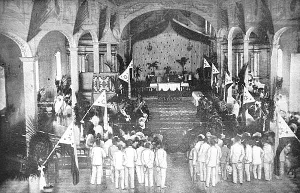On June 2, 1899, the Malolos Congress declared war on the United States, with its President, Pedro Paterno, issuing the Proclamation of War.
Prior to this proclamation, several battles had already occurred between the Filipino and American forces.
Accordingly, this phase of the Philippine–American War, also known as the Philippine War of Independence or the Philippine Insurrection (1899– 1902) was an armed military conflict between the Philippines and the United States which arose from the struggle of the First Philippine Republic to gain independence following annexation by the United States.
The Filipinos under the leadership of General Emilio Aguinaldo rejected the annexation of the Philippines and were determined to defend their freedom.
From the very start, the Americans manifested bad faith when they refused to recognize Philippine Independence after it was declared by General Aguinaldo on June 12, 1898 in Kawit, Cavite.
Inevitably, the Santa Mesa incident on February 4, 1899, led to the outbreak of hostilities when an American sentry shot a Filipino soldier.
Hence, the Philippine-American war ensued between 1899 and 1902 with Filipinos at a disadvantage, for they had no sufficient arms with which to fight the enemy. But it took the Americans almost three years to conquer the Filipinos.
The proclamation urging the Filipino people to continue the war.
TO THE FILIPINO PEOPLE:
No one is ignorant of the fact that since we took the direction of the ship of state we have sacrificed ourselves to the service of the government of our republic, offering ourselves as victims for the sake of peace, without abandoning the sacred ideal of liberty and independence which fires our country, but the North Americans refuse to suspend hostilities asked for by us to consult the national assembly, seat of the free popular will.
Well, since they wish it, may the responsibility for the war and its consequences fall on the great nation of the United States of America. We have behaved as patriots and human beings, showing the great powers of the world that the present cabinet acts with a diplomacy which protects our cause as do the arms which defend our rights.
The council of government, deciding to preserve our republican institutions, national independence and the presidency of Don Emilio Aguinaldo, in spite of the Americans, who intend to construct upon our ruins the edifice of tyranny, has concluded to continue the war, preserving unhurt in their spirit and letter our constitution and laws, which we have conquered with so much blood such sacrifices.
To war, then, beloved brothers, to war.
In order that the people be free it is necessary for them all to be brave. Rich or poor, learned or ignorant, beloved Filipinos, hasten to unite to save our native land from insult and ignominy punishments and scaffolds, and from the sad and fatal inheritance of enslaved generations.
The God of war, in whom we have put our faith and hope, is helping us. Confusion, interior and international di;ssensions and conflicts rend the invading army. Its volunteers, being aware that we are in the right, fight without enthusiasm and only in compliance with their forced military duty. Within the American nation itself a great political party asks for the recognition of our rights, and Divine Providence watches over the justice of our cause.
Forward, Filipinos, and the sun of victory will shine on us.
Viva the Filipino sovereign people!
Viva national independence!
Viva the liberating army!
Viva Don Emilio Aguinaldo, President of the Republic!
PEDRO A. PATERNO.
Source: The Development of Philippine Politics, Pages 199-200.
References
- Philippines News Agency archives
- The Development of Philippine Politics, Maximo M. Kalaw, Manila, 1927.


No comments:
Post a Comment